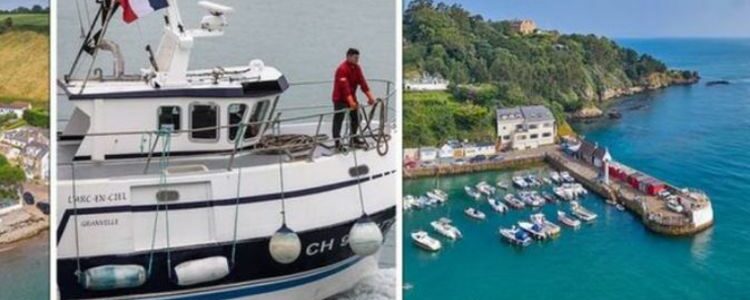
Empty threat! Jersey dismisses France claim it will cut energy supplies
Brexit: EU making Jersey fishing deals difficult says Thompson
We use your sign-up to provide content in ways you’ve consented to and to improve our understanding of you. This may include adverts from us and 3rd parties based on our understanding. You can unsubscribe at any time. More info
France’s Europe minister Clement Beaune said yesterday the Trade and Cooperation Agreement should be “implemented fully” and that if it is not, “we will take European or national measures to exert pressure on the UK”. Asked what actions could be taken, Mr Beaune pointed to both UK exports to France and European energy exports to the UK.
But on Tuesday, the Government of Jersey rebuffed the claims and made clear Ministers had a long-standing with EDF which is French state-owned for their electricity.
Jersey gets 95 percent of its electricity supply from France through undersea cables from Normandy.
A Government of Jersey spokeswoman said: “Jersey has followed the process set down by the Trade and Co-operation Agreement throughout the process of allocating licences.
“We have worked to ensure that boats which can show evidence of fishing in Jersey’s waters are able to continue doing so, and we remain open to receiving further evidence of fishing activity.


“We are continuing to work collaboratively to resolve the remaining issues.
“Jersey’s electricity service is underpinned by a long-term contract with EDF and we do not anticipate any interruptions in supply.”
Meanwhile, a document released by the Department for Business, Energy and Industrial Strategy (BEIS) in July this year said that, as of 2020, just under half of the UK’s electricity imports (47 percent) was from France.
Fishing rights for EU boats in UK waters were a key stumbling block to negotiations for a post-Brexit trade accord between London and Brussels after Britain’s exit from the bloc on January 1, 2021.

The dispute flared in May when a flotilla of around 50 French trawlers massed in front of the Saint Helier harbour on Jersey, a self-governing territory that along with fellow crown dependency Guernsey depends on the UK for its defence.
The protest sparked a tense standoff that even drew in French and British military vessels.
Since then, French fishermen have applied for the new access licences but complain of onerous paperwork and a requirement to prove they had fished in British and Jersey waters before Brexit.
Tensions also rose after the UK Government announced last month that it had approved just 12 of the 47 applications it had received from French small boats to fish in British waters.
DON’T MISS:
Tory grandee Hague says IndyRef2 would weaken UK against Russia [LATEST]
Boris to overrule SNP power and give ‘Union’ cash after Sturgeon snub [REVEAL]
Boris Johnson to overrule Sturgeon in Brexit trade plot [INSIGHT]
Jersey: Don Thompson says fishermen ‘fed up’
That anger was further stoked in a later announcement by the Government of Jersey that of 170 licence applications it had received from French boats, 75 had been rejected.
French Prime Minister Jean Castex told the French Parliament yesterday that bilateral cooperation between France and Britain was at risk in the dispute.
The two countries work together on issues like illegal migration in the Channel.
Mr Castex said that he had asked the EU Commission to take a tougher stance on London to ensure that Britain complied with its commitments under the terms of its accord on the British exit from the EU.
He warned: “If that does not work we will go the (Brexit deal) arbitration panel to get the British to keep their word and, more broadly, we will question all the conditions of the implementation of accords with the EU and also, if necessary, the bilateral cooperation we have with the UK.”
He described the situation as “intolerable”.
UK Brexit Minister Lord Frost hit back at the energy warning by arguing it was “unreasonable” to suggest Britain was acting in bad faith when it came to allocating post-Brexit fishing licences to French boats.
He instead argued London had been “extremely generous” to European Union requests.
Source: Read Full Article